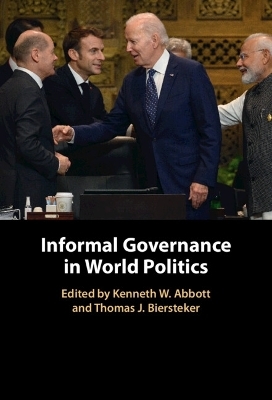
Informal Governance in World Politics
Cambridge University Press (Verlag)
978-1-009-18054-2 (ISBN)
Throughout the nineteenth and twentieth centuries, cooperation among nations was based on international regimes and formal intergovernmental organizations. However, since the 1990s, informal modes of global governance, such as informal intergovernmental organizations and transnational public-private governance initiatives, have proliferated. Even within formal intergovernmental organizations, informal means of influence and informal procedures affect outcomes whilst, around all these institutions, even more informal networks shape agendas. This volume introduces and analyzes these three types of informality in governance: informality of, within, and around institutions. An introductory chapter traces the rise of informal governance and suggests a range of theoretical perspectives and variables that may explain this surge. Empirical chapters then apply these and other explanations to diverse issue areas and cross-cutting issues, often using newly developed datasets or original case study research. The concluding chapter sets out a research agenda on informality in global governance, including its normative implications.
Kenneth W. Abbott is Jack E. Brown Chair in Law Emeritus at Arizona State University. Professor Abbott's research focuses on global governance institutions. He studies a wide range of public, private, and hybrid institutions and institutional complexes in fields including environment, health and corruption, and diverse governance modes, including intermediaries and orchestration. He received the inaugural Distinguished Scholar Award from the ISA International Law Section in 2017. Thomas J. Biersteker is Gasteyger Professor Honoraire at the Geneva Graduate Institute and a Public Policy Fellow at the Wilson Center in Washington. Professor Biersteker's research focuses on global governance, international sanctions, and dialectical approaches to IR theory. He concentrates on UN sanctions, has addressed the UN Security Council, and regularly briefs Security Council members on sanctions issues. He received the Professional Achievement Award from the University of Chicago in 2020.
Introduction: 1. Informality in global governance: an introduction Kenneth W. Abbott and Thomas J. Biersteker; Part I. Informality of Institutions: 2. From complex interdependence to complex governance Miles Kahler; 3. Soft pooling: how IIGOs govern collective decision-making without delegation Duncan Snidal and Felicity Vabulas; 4. Informal governance in the development regime: a political economy perspective on two types of informal organizations Bernhard Reinsberg; 5. Informal governance of international climate policy Axel Michaelowa, Katharina Michaelowa and Chandreyee Namhata; 6. Why do states cooperate informally? Comparing secret agreements in Europe and the Middle East Barbara Koremenos and Melissa Carlson; Part II. Informality Within Institutions: 7. International consequences of domestic politics: how divided government drives informal US influence in the World Bank Erasmus Kersting and Christopher Kilby; 8. Knowledge guardians in informal networks: how international organizations retain knowledge of strategic errors Heidi Hardt; Part III. Informality Around Institutions: 9. The role of transnational policy networks in informal governance: creating the office of the ombudsperson at the United Nations Thomas J. Biersteker; Part IV. Normative Issues: 10. Can informal governance promote procedural justice? Lora Anne Viola; Conclusion: 11. Conclusions: a research agenda on informal global governance Kenneth W. Abbott and Thomas J. Biersteker.
| Erscheinungsdatum | 18.05.2024 |
|---|---|
| Zusatzinfo | Worked examples or Exercises |
| Verlagsort | Cambridge |
| Sprache | englisch |
| Themenwelt | Sozialwissenschaften ► Politik / Verwaltung ► Europäische / Internationale Politik |
| ISBN-10 | 1-009-18054-1 / 1009180541 |
| ISBN-13 | 978-1-009-18054-2 / 9781009180542 |
| Zustand | Neuware |
| Haben Sie eine Frage zum Produkt? |
aus dem Bereich


